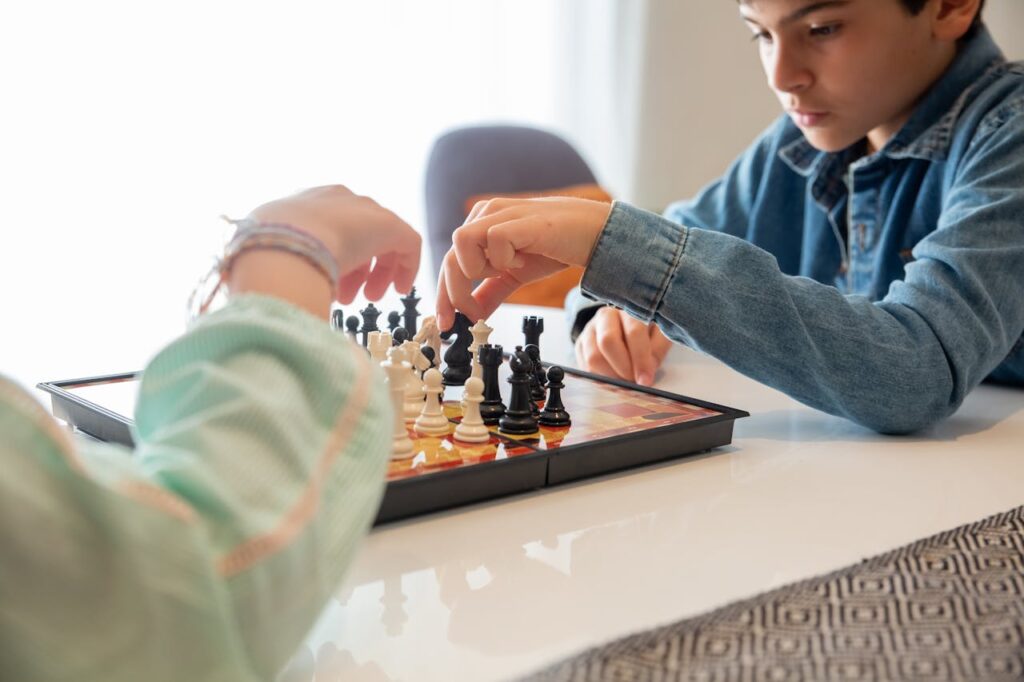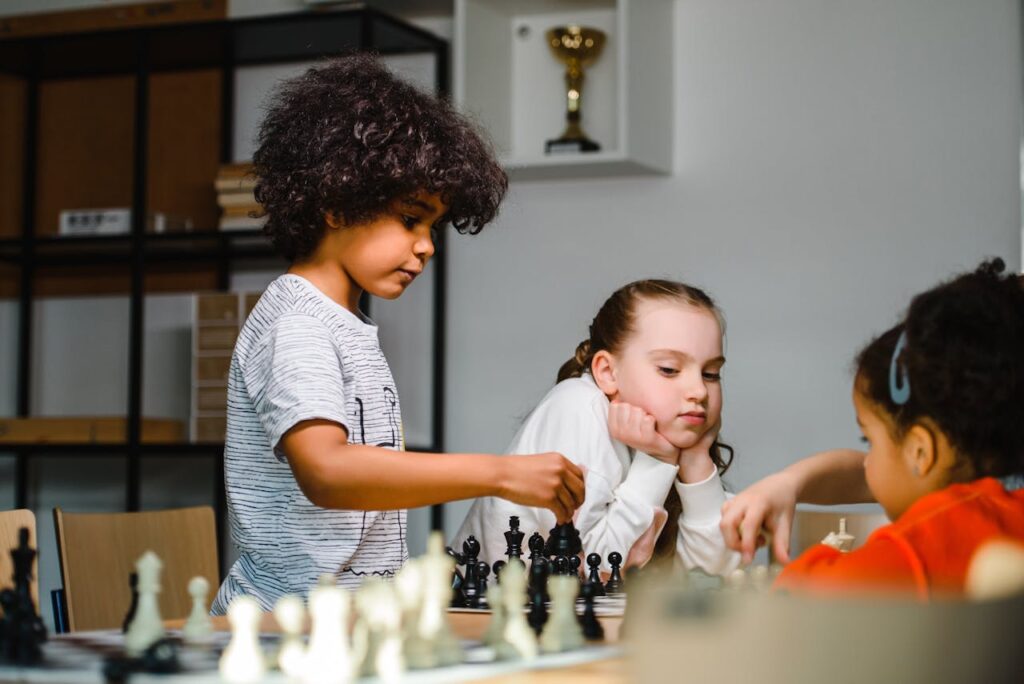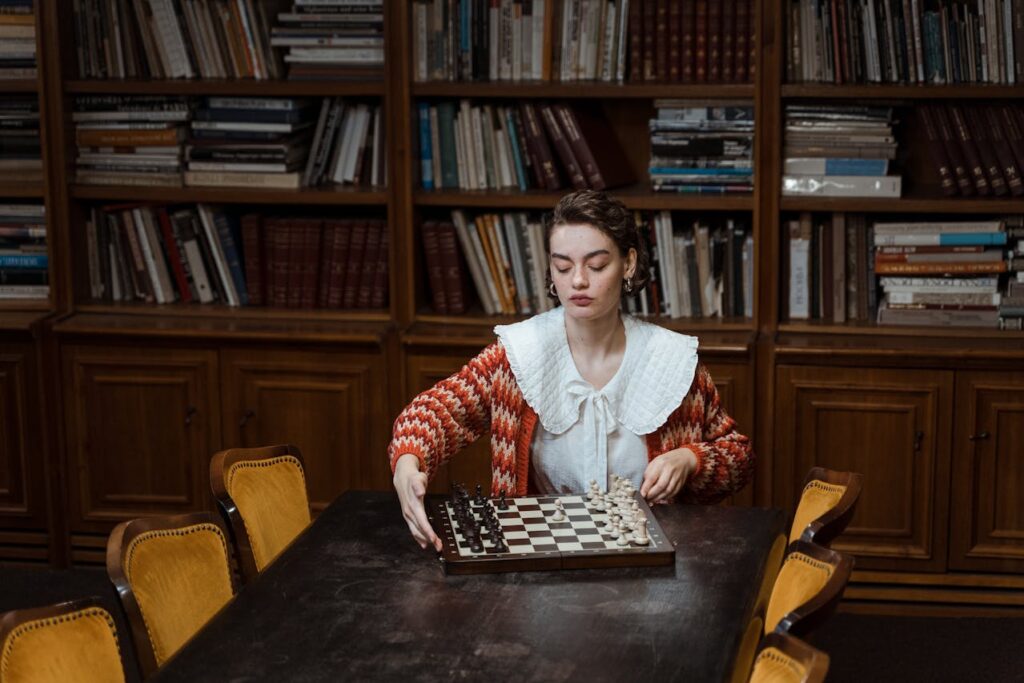Every parent dreams of raising a child who can think critically, solve problems creatively, and make decisions confidently. In a world where quick thinking and adaptability are increasingly valuable, developing these skills from a young age is essential.
One of the most effective and enjoyable ways to nurture these abilities in your child is through the game of chess. Chess is not just a board game; it’s a powerful educational tool that helps children learn to think strategically, plan ahead, and make thoughtful decisions.
Developing Critical Thinking Skills Through Chess
Critical thinking is the ability to analyze information, evaluate different perspectives, and make informed decisions. It’s a skill that lies at the heart of effective problem-solving and decision-making.
Chess, with its complex rules and strategic depth, is a fantastic way to help children develop these critical thinking abilities.
Encouraging Analytical Thinking
Chess is a game of analysis. From the very first move, players must evaluate the board, consider the implications of each possible action, and anticipate their opponent’s responses.
This constant analysis helps children sharpen their ability to think logically and methodically.
For example, when a child considers moving a piece, they must weigh the pros and cons of that move. Is it better to advance a pawn or to develop a more powerful piece like a knight or bishop?
What will happen if they move that piece—will it open them up to attack, or will it strengthen their position?
This process of evaluating options, predicting outcomes, and making decisions is central to critical thinking.
Learning to Think Independently
One of the greatest benefits of chess is that it teaches children to think independently.
Unlike many activities where they might rely on instructions or follow someone else’s lead, chess requires players to make their own decisions.
There are no right or wrong answers in chess—only the decisions that a player believes will lead them to victory.

This independence is empowering for children. It gives them the confidence to trust their own judgment and the courage to take risks.
They learn that it’s okay to make mistakes and that every decision is an opportunity to learn and grow.
Enhancing Problem-Solving Abilities
Chess is essentially a series of problems that need to be solved. How do you protect your king while attacking your opponent’s? What’s the best way to control the center of the board?
How do you respond to an unexpected move by your opponent? These are just a few of the questions that players must answer during a game.
By regularly engaging in chess, children develop strong problem-solving skills.
They learn to break down complex problems into smaller, more manageable parts, consider multiple solutions, and choose the best course of action based on the information available.
This approach to problem-solving is incredibly valuable in everyday life, where challenges often require careful thought and creative solutions.
Planning Ahead: The Foundation of Strategic Thinking
One of the most essential skills in chess—and in life—is the ability to plan ahead. In chess, players must think several moves ahead, anticipate their opponent’s actions, and adjust their strategies as the game progresses.
This forward-thinking approach is a critical component of strategic thinking and is one of the key lessons that chess imparts to children.
Understanding the Importance of Foresight
Chess teaches children that every move has consequences. A seemingly minor decision can have a significant impact several moves later.
For example, moving a pawn early in the game might seem insignificant, but it could open up opportunities for your opponent or create weaknesses in your own defense.
Understanding the potential consequences of each move encourages children to think ahead and plan their actions carefully.
This concept of foresight is vital in many aspects of life.
Whether it’s planning a school project, making financial decisions, or setting personal goals, the ability to anticipate future outcomes and prepare accordingly is crucial.
Chess helps children develop this skill by requiring them to constantly evaluate their position and think about how their current decisions will affect their future opportunities.
Teaching Patience and Deliberate Action
Chess is a game that rewards patience and careful planning.
Unlike fast-paced games that rely on quick reactions, chess requires players to take their time, think through their options, and make deliberate decisions.
This focus on thoughtful, measured action helps children develop the patience needed for strategic thinking.

In chess, rushing can lead to mistakes. A hasty move might overlook a critical detail or expose a vulnerability that the opponent can exploit.
By contrast, taking the time to thoroughly consider each move helps players avoid these pitfalls and make more informed decisions.
This patience is a valuable lesson that extends beyond the chessboard.
Adapting Plans to Changing Circumstances
While planning is crucial in chess, so is the ability to adapt when things don’t go as expected. Even the best-laid plans can be disrupted by an opponent’s unexpected move or an unforeseen challenge.
Chess teaches children that flexibility is a key component of strategic thinking and that the ability to adjust plans on the fly is just as important as the initial strategy.
When a child plays chess, they quickly learn that rigidity in strategy can lead to failure.
For example, if their opponent makes a move that counters their planned attack, they must adapt by finding a new approach.
This requires quick thinking, creativity, and the ability to remain calm under pressure.
Balancing Short-Term and Long-Term Goals
Another important lesson chess teaches is the balance between short-term and long-term goals. In chess, players must manage both immediate threats and long-term strategy.
Sometimes, sacrificing a piece in the short term can lead to a stronger position later in the game.
Understanding when to prioritize short-term gains versus long-term strategy is a critical aspect of strategic thinking.
For example, a child might be faced with the decision to capture an opponent’s pawn, which offers an immediate advantage, or to develop a piece to a stronger position, which could lead to greater benefits later on.
Learning to balance these competing priorities helps children develop the ability to make decisions that consider both immediate needs and future possibilities.
Enhancing Decision-Making Skills
Decision-making is a fundamental part of both chess and life. The ability to make sound decisions, especially under pressure, is a hallmark of a strategic thinker.
Chess is a game that constantly challenges players to make decisions—some small, some large—and each one contributes to the outcome of the game.
Making Informed Choices
Chess is all about making informed decisions. Every move on the chessboard should be made with a clear understanding of the current situation, the potential risks, and the possible rewards.
This process encourages children to gather all relevant information, consider their options, and make decisions based on logic and analysis rather than impulse.

For example, before deciding to move a piece, a child might ask themselves: What is the purpose of this move? How will it affect my position? What could my opponent do in response?
By considering these questions, the child learns to approach decision-making thoughtfully and strategically.
Evaluating Risks and Rewards
In chess, as in life, every decision involves some degree of risk. Moving a piece might expose it to capture, but it might also create an opportunity to gain an advantage.
Chess teaches children to evaluate these risks and rewards carefully, helping them develop a balanced approach to decision-making.
For instance, a child might decide to sacrifice a pawn in order to open up a more powerful attack on their opponent.
This decision requires them to weigh the potential loss of the pawn against the potential gain of a stronger position.
By practicing this kind of risk-reward analysis, children learn to take calculated risks—those that offer the potential for significant rewards but with a clear understanding of the possible downsides.
Learning from Mistakes
One of the most valuable lessons chess teaches is the importance of learning from mistakes. No one plays a perfect game of chess every time, and even the best players make errors.
What sets successful players apart is their ability to learn from these mistakes and improve over time.
When a child makes a mistake in chess—such as moving a piece without fully considering the consequences—they have the opportunity to reflect on what went wrong and why.
They can then apply these lessons to future games, gradually improving their decision-making skills.
This process of reflection and learning is a key component of developing a strategic mindset.
Making Decisions Under Pressure
Chess often requires players to make important decisions under time constraints, especially in timed games or tournaments.
This pressure forces children to think quickly and make decisions with confidence, even when they don’t have all the time they might like to analyze the situation.
Playing chess helps children develop the ability to remain calm under pressure and make decisions quickly and effectively.
They learn to trust their instincts, rely on their training, and act decisively, even when the stakes are high.
Building Confidence in Decision-Making
As children become more experienced in chess, they naturally build confidence in their decision-making abilities.
Each successful move, each well-executed strategy, reinforces their belief in their ability to think critically and make good decisions.
This growing confidence translates into other areas of life, helping children become more self-assured and independent.

For example, a child who is confident in their decision-making skills might be more willing to take on leadership roles in school, make new friends, or try new activities.
They understand that they have the ability to assess situations, make informed choices, and handle the consequences—whether those are positive or negative.
Translating Chess Skills to Real-Life Situations
The strategic thinking, planning, and decision-making skills developed through chess are not confined to the game itself—they have a broad impact on a child’s life, helping them navigate academic challenges, social interactions, and even their future careers.
Academic Success Through Strategic Thinking
One of the most direct ways that chess benefits children is through their academic performance.
The critical thinking and problem-solving skills that chess cultivates are directly applicable to subjects like math, science, and literature.
In each of these areas, students are required to analyze information, draw connections, and develop solutions—just as they do in chess.
For instance, a child who plays chess might approach a complex math problem with the same methodical thinking they use to navigate a challenging chess game.
They’ll break the problem down into smaller parts, consider different approaches, and choose the strategy that is most likely to lead to the correct solution.
This analytical approach is not only useful in math but also in writing essays, conducting scientific experiments, and understanding historical events.
Social Skills and Emotional Intelligence
Chess also plays a significant role in developing social skills and emotional intelligence.
While it’s often played as an individual game, chess is a social activity that requires interaction with opponents, coaches, and fellow players.
These interactions help children learn how to communicate effectively, handle competition gracefully, and manage their emotions.
For example, when playing against an opponent, children learn the importance of sportsmanship.
They must respect their opponent’s skill, accept both wins and losses gracefully, and maintain a positive attitude regardless of the outcome.
This experience fosters empathy, humility, and the ability to work well with others—all essential components of emotional intelligence.
Leadership and Teamwork
While chess is typically seen as a solo endeavor, the skills it teaches are highly relevant to leadership and teamwork.
In chess, players must take responsibility for their decisions, think critically about their strategies, and lead themselves to victory.
These skills translate well to leadership roles in other areas, where clear decision-making and strategic thinking are essential.

For instance, a child who excels at chess may find themselves naturally taking on leadership roles in group projects or extracurricular activities.
They understand how to plan and execute strategies, anticipate potential challenges, and guide their team toward a common goal.
The confidence they gain from making decisions on the chessboard empowers them to take charge and lead others effectively.
Preparing for Future Careers
The skills developed through chess—strategic thinking, decision-making, problem-solving, and leadership—are highly valued in the professional world.
As children grow up and begin to explore different career paths, the abilities they’ve honed through chess can give them a significant advantage.
For example, careers in business, law, technology, and engineering all require the ability to think strategically, analyze complex problems, and make decisions based on incomplete information.
Chess players, who are accustomed to weighing options, anticipating outcomes, and adapting to new challenges, are well-equipped to succeed in these fields.
Fostering Creativity and Innovation
While chess is often associated with logic and strategy, it’s also a game that encourages creativity and innovation.
The ability to think creatively is a key aspect of strategic thinking, and chess provides a unique environment where children can develop this skill in a structured and engaging way.
Encouraging Creative Problem-Solving
Chess is a game of infinite possibilities. While there are established strategies and openings, no two games are ever exactly the same.
This dynamic nature of chess encourages children to think creatively and develop their own solutions to the challenges they face on the board.
For instance, when faced with a complex position, a child might experiment with an unconventional move or strategy.
This willingness to explore new ideas and take creative risks is a key component of innovation.
Chess teaches children that sometimes the best solutions are those that are not immediately obvious and that thinking outside the box can lead to success.
Developing Strategic Innovation
In addition to fostering creativity, chess also teaches children the importance of strategic innovation.
In a game where every move counts, players must constantly adapt their strategies and find new ways to outmaneuver their opponents.
This process of strategic innovation helps children develop the ability to think critically and make decisions that balance creativity with practicality.
For example, a child might discover a new opening that throws their opponent off balance or devise a clever trap that leads to a winning position.
These moments of strategic innovation are not just about creativity; they’re about applying creative ideas in a way that leads to concrete results.
Conclusion
Chess is far more than just a game; it’s a powerful educational tool that nurtures the skills necessary for strategic thinking, creativity, and personal growth.
Through chess, children learn to think critically, plan ahead, make informed decisions, and adapt to changing circumstances.
These are not just skills for winning games—they are life skills that will serve your child well in school, relationships, and future careers.
By introducing your child to chess, you’re giving them the opportunity to develop a growth mindset, where they see challenges as opportunities to learn and improve.
They’ll learn the value of patience, persistence, and hard work, and they’ll gain the confidence to take on new challenges with creativity and resilience.
READ NEXT:
- Why Chess is the Ultimate Brain Workout for Kids
- How Chess Enhances Problem-Solving Skills in Adults
- Why Chess is the Ultimate Brain Workout for Grown-Ups
- Chess in Early Education: A Parent’s Guide
- Chess as a Tool for Maintaining Mental Sharpness in Later Life
- The Science Behind Chess and Improved Decision-Making for Adults
- Chess and Cognitive Health: Delaying Mental Decline in Adulthood

